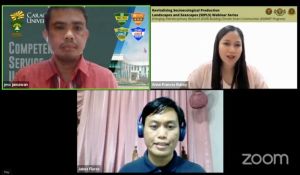
Dr. Jess. H. Jumawan (top left), Ms. Anne Frances Buhay (top right), and Dr. Jabez Joshua M. Flores (center) during the Q&A session of the second episode of the Revitalizing Socioecological Production Landscapes and Seascapes (SEPLS) Webinar Series.
The University of the Philippines Open University (UPOU) conducted the second episode of the Revitalizing Socioecological Production Landscapes and Seascapes (SEPLS) Webinar Series on 29 April 2022. SEPLS is an online activity by Project 1 of the Emerging Interdisciplinary Research (EIDR), Building Climate Smart Communities (bSMART) Program of the University of the Philippines (UP) System and implemented by UPOU and UP Los Baños (UPLB). The initiative aims to raise awareness on the conservation and sustainable use of SEPLS through a series of online discussions with speakers and experts on sustainable landscape and seascape management approaches.
Dr. Jabez Joshua M. Flores, Project Leader of Permaculture Research Philippines, Senior Lecturer at the UP Rural High School of UPLB, and Spatial Data Scientist of Pure Earth – Philippines, was the guest speaker. Dr. Jess. H. Jumawan, Professor of Caraga State University, was the discussant. Ms. Anne Frances Buhay, Project Research Assistant of EIDR, bSMART Program, served as the host.
Dr. Flores discussed his study titled “Reimagining Agricultural Landscapes for Ecosystem Restoration using Permaculture Design.” He reminded everyone that there is an urgent need to reimagine our agricultural landscapes as more land has been cleared due to urbanization and food supply needs resulting in deforestation and a decrease in biodiversity. To manage these landscapes, Dr. Flores proposed to have a shared vision for a reimagined agriculture, to set a goal to restore degraded landscapes and ecosystems, and to design systems sustainably and regeneratively using permaculture. He clarified that the design process–how you think, organize, and utilize the available resources in designing the farm–and the goal of the farm–which is not just to produce food but also to heal the landscape and our ecosystems–differentiates permaculture from other farming methods.
Dr. Jumawan, on the other hand, shared that permaculture is an international movement and ecological design system. He added that the term “permaculture” is coined from “permanent agriculture” and is defined by co-originator David Holmgren as “consciously designed landscapes which mimic the patterns and relationships found in nature, while yielding an abundance of food, fiber and energy for provision of local needs.” He stated that permaculture allows the engagement in agriculture without external inputs since it harnesses the available resources in the environment. He highlighted permaculture’s function which can serve as a framework for integrating knowledge and practice across disciplines to support collaboration with a mixed group of researchers, stakeholders, and land users.
A short Q&A session followed after the presentations. Questions concerning setting aside traditional farming methods in place of permaculture practice, training farmers by landowners to practice permaculture, and adopting permaculture design by farmers who don’t own the land were tackled during the session. Certificates of appreciation were then awarded to the resource speaker and the discussant.
The webinar was held live on Zoom and streamed live via Facebook. The SEPLS Webinar Series is accessible through the Philippine Satoyama Facebook page and YouTube channel.
Written by Jaime P. Guimbao
Edited by Myra C. Almodiel and Anna Cañas-Llamas








![[Job Vacancy]
The UP Open University is looking for one (1) University Extension Associate I under the Faculty of Information and Communication Studies (FICS).
For more information, visit upou.edu.ph/job-opportunities/ and submit your application via url.upou.edu.ph/hrapplication on or before 23 February 2026.
#UPOU
#UPOpenUniversity
#JobVacancy](https://www.upou.edu.ph/wp-content/plugins/instagram-feed/img/placeholder.png)